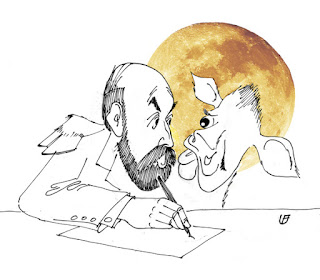Word of the Month: Index
My post on Christian Morgenstern from a few days ago suggested to me the current WoM, which is both a verb and a noun (when capitalized). It refers to a close-lipped smile that expresses good-natured joy, amusement, or satisfaction in response to something just encountered or remembered. Because of that, it is more specific than smile (lächeln in German)—you may bare your teeth when someone takes your picture or when you are kissing babies on a campaign stop without enjoying the situation. English "grin" comes close, but schmunzeln is less in-your-face and usually done without malice—nobody would ever tell you to wipe it off your face. "Smirk" is not the same because it always has negative connotations*, and "laugh" is different altogether because it's open-mouthed and usually accompanied by a sound track.
I have to admit that schmunzeln is somewhat old-fashioned, which is too bad because to me, it is the perfect response to a poem by Morgenstern.
As to its etymology, I had supected that it may have entered German via Yiddish, but Duden Online set me straight—it can be traced back to a Middle High German form.
____________
* A friend on Google+, Laura Gibbs, just commented: "Something about smirk: I've noticed that my students often use it with entirely positive connotations, and they are surprised when I tell them it (usually) has negative connotations. So I think something is happening to that word in English...but I am not sure why it is happening. Smile and grin both seem like words in good health! Hmmm..."
The Inscrutable Sky
1 week ago




